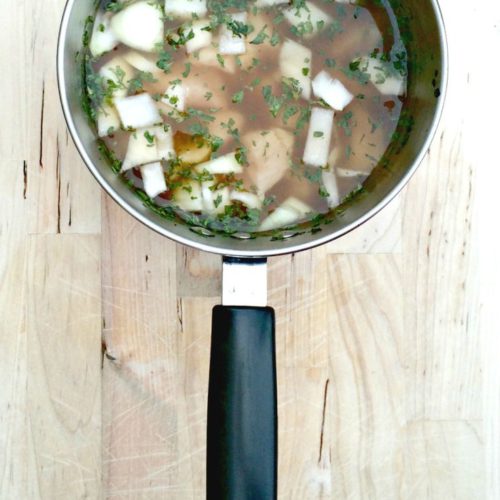Chicken is a good source of protein and iron, making it an excellent first meat for babies. This puree recipe is tailored to suit the sensitive digestive systems of little ones, introducing them to the taste and texture of meat in a gentle way.

Homemade Chicken Puree for 6-Month-Old Baby
This homemade chicken puree provides essential protein for your 6-month-old baby's growth and development. Prepared without added salt or spices, it's a simple and nutritious introduction to meat-based solids.
Equipment
- sauce pan
- serving bowl
Ingredients
- 1 boneless, skinless chicken breast
- water
- chicken broth
Instructions
- Rinse the chicken breast under cold running water to remove any impurities.Cut the chicken breast into small, uniform pieces. This helps in even cooking and blending.
- In a small saucepan, bring 1 cup of water or low-sodium chicken broth to a gentle boil.Add the chicken pieces to the boiling water. Reduce the heat to low, cover the saucepan, and let the chicken simmer for about 15-20 minutes, or until fully cooked. The chicken should be white throughout and have no pink in the center.
- Using a slotted spoon, transfer the cooked chicken pieces to a blender or food processor. Reserve the cooking liquid.
- Blend the chicken until you achieve a smooth and creamy puree. If the puree is too thick, you can add a little bit of the reserved cooking liquid (or plain water) in small increments until you reach the desired consistency.
- Let the chicken puree cool down to a suitable temperature before feeding your baby. Always check the temperature by tasting a small amount yourself.
- Serve a small spoonful to your baby and observe their reaction. If they seem comfortable with the taste and texture, continue feeding.
- If there's leftover puree, you can store it in an airtight container in the refrigerator for up to 24 hours. For longer storage, freeze individual portions in ice cube trays and transfer the frozen cubes to a freezer bag. Thaw and reheat when needed.
Video
Notes
- Avoid adding salt, spices, or seasoning to the baby's food at this stage. Their delicate digestive system is still adapting to solid foods.
- Always supervise your baby while they are eating, especially when introducing new foods.
- Consult with your pediatrician if you have concerns about allergies or if you're introducing a new food to your baby for the first time.
Nutrition
Serving: 600g
Tried this recipe?Let us know how it was!
